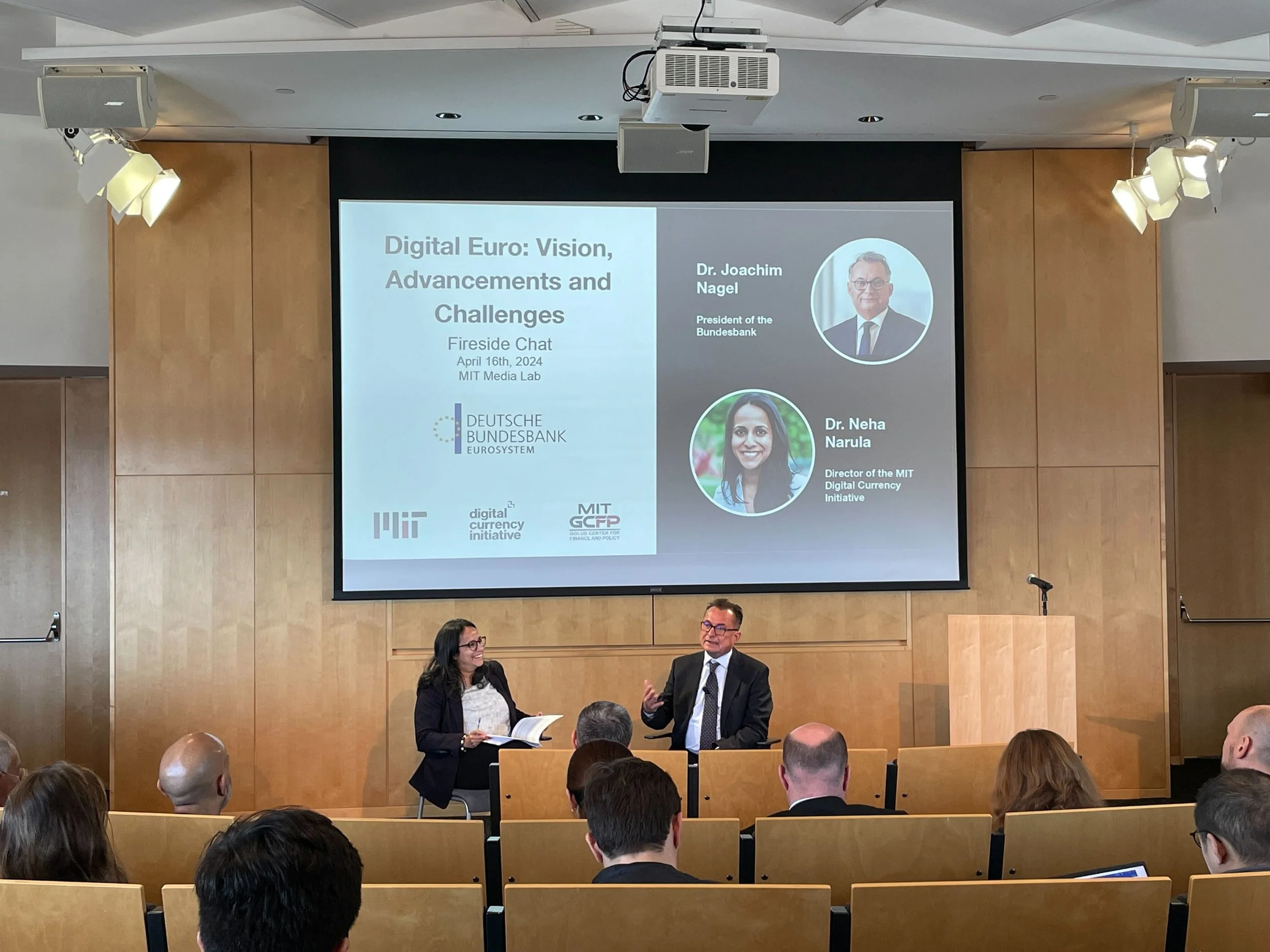On April 16, Dr. Joachim Nagel, President of the Deutsche Bundesbank, the central bank of Germany, visited the MIT Media Lab. There, he announced this new collaboration between the Bundesbank and the DCI for central bank digital currency design research.
Read MoreIn November, MIT Digital Currency Initiative research scientist Daniel Aronoff participated in a panel discussion along with Ed Golding, Executive Director of the MIT Golub Center for Finance, on fintech and the digitization of finance at the MIT Research and Development Conference. The lively conversation touched on many topics relevant to DCI’s work, including safeguarding privacy in central bank digital currencies, decentralizing repo markets through smart contracts, and the future of cash.
Read MoreOn April 22-23, the MIT Bitcoin Club hosted the 10th MIT Bitcoin Expo. DCI director Neha Narula gave a keynote speech, Cryptoeconomic Systems managing editor Reuben Youngblom presented a talk titled "The 70 Megaton Gorilla: Addressing the PoW climate narrative," and DCI software engineer Sam Stuewe presented an asynchronous talk titled "Are We CBDC Yet? A Healthy Dose of Skepticism." Sam also mentored participants in the Expo's Hackathon.
Read MoreOn Tuesday, January 17th at the World Economic Forum in Davos, Switzerland, Axios markets reporter Courtenay Brown and MIT Media Lab Digital Currency Initiative director Neha Narula considered the most pressing issues facing cryptocurrency today including how (and if) the industry should be regulated, how governments and financial institutions should interact with the sector, and how investments could be safeguarded. The View from the Top sponsored segment featured Ripple chief executive officer Brad Garlinghouse.
Read MoreThe Massachusetts Institute of Technology (MIT) Digital Currency Initiative (DCI) and associated organizations marshaled a sizable team of researchers in four low- and middle-income countries — India, Indonesia, Nigeria and Mexico — to study inclusion issues related to retail central bank digital currency (CBDC) design. They released the results of their 15-month research project on Jan. 13.
In spite of a growing body of work related to CBDCs, “few if any proponents have offered practical insight into how CBDC will promote greater access to financial services,” the DCI, along with the MIT Media Lab and Maiden Labs, claimed.
Read MoreA Consensus panel from Austin, Texas, "Money Reimagined" host Michael Casey starts off the introductions of an important discussion with Emily Parker, CoinDesk's executive director of global content; the Honorable J. Christopher Giancarlo, dubbed “CryptoDad,” served as 13th Chairman of the United States Commodity Futures Trading Commission; and Neha Narula is the Director of the Digital Currency Initiative at the MIT Media Lab, to discuss the social and geo-political implications of the rise of international competition between central bank digital currencies, stablecoins and native crypto currencies.
Read MoreCollaboration with Federal Reserve Bank of Boston yields progress in understanding how a digital currency might be developed in the future.
CAMBRIDGE, Mass. -- In collaboration with a team at the Federal Reserve Bank of Boston, MIT experts have begun designing and testing technical research through which further examination of a Central Bank Digital Currency (CBDC) can be performed in the U.S.
The effort, known as Project Hamilton, is in an exploratory phase, and the research is not intended as a pilot or for public deployment. Instead, the researchers have explored two different approaches that could be used to process transactions, and thus could indicate the technical feasibility of a potential CBDC model. In a process involving significant design flexibility, the MIT group tested factors such as the volume and speed of transactions, and the resilience of the systems in general, among other requirements for a viable digital currency.
Read MoreRead the technical paper, A High Performance Payment Processing System Designed for Central Bank Digital Currencies, and executive summary here.
Read MoreIntense interest in cryptocurrencies, like bitcoin, and the Covid-19 pandemic have sparked debate among central banks on whether they should issue digital currencies of their own. Advocates argue that central bank digital currencies, or CBDCs, can make cross-border transactions easier, promote financial inclusion, and provide payment system stability. Here's how central bank digital currencies could become the future of digital finance.
Read MoreOn this week's Money Movement we're joined by Visa's Head of Crypto, Cuy Sheffield; Neha Narula, the Director of MIT's Digital Currency Initiative, an institute leading research and development in crypto, digital currency and now CBDC models; and Robert Bench, AVP at the Federal Reserve Bank in Boston, and a key contributor and collaborator on the future of digital currency with the Federal Reserve.
Read MoreThe Bank of England released a Central Bank Digital Currency (CBDC) Discussion Paper on March 12th, 2020. The DCI curated a response, led by Rob Ali, which explored topics in the paper (June 12th, 2020)
Read MoreAbstract
The United States financial system can be restructured by giving universal direct access to credit risk-free central bank money. In the 10 years since the financial crisis, technological advancements and regulatory tools have laid the foundation for Central Bank Digital Currencies to emerge as this economic resolution. Our paper analyzes similar economic cases and contends that introducing Central Bank Digital Currencies (CBDCs) can improve financial stability without degrading credit availability in the long term. We illustrate this by focusing on similar market shifts, namely in the U.S. student loan market and the New Zealand agribusiness sector. Our analysis showcases that by introducing CBDCs, market participants can subsequently remove certain market subsidies that promote poor risk practices and improper pricing. This subsidy to financial institutions is both explicit in the form of FDIC deposit insurance and implicit in the stipulation of taxpayer funded bailouts that materialized in 2008. We calculate the effect of introducing CBDCs by focusing on historical market examples when similar fundamental market shifts happened. Our conclusion is that CBDCs may diminish credit availability, but this effect is ameliorated as financial stability improves in subsequent years. Accordingly, we recommend a roadmap for rolling out CBDCs in the least disruptive fashion.
Read MoreFor central bankers, the game changed last summer when Facebook unveiled its proposal for Libra. Many have responded by seriously exploringwhether and how they should issue their own digital money.
Arguably, though, the more fundamental change is more than a decade old. It was Bitcoin that first made it possible to transfer digital value without the need for an intermediary, a model that competes directly with the traditional financial system. The network’s resilience against attackers suggests there is another way of setting up the system.
Last weekend at the MIT Bitcoin Expo held on campus in Cambridge, Massachusetts, I sat down with experts familiar with central banking as well as cryptocurrency. We discussed the practical concerns central bankers should be considering as they begin to design their own digital money systems. One common theme: central bankers have plenty to learn from Bitcoin.
Read MoreProponents say payments with a digital dollar would be faster and easier. Opponents say it would be costly and inefficient.
The nature of money is changing, and central banks around the world are debating whether they need to change with it.
As electronic payments take off and private cryptocurrencies such as bitcoin seek to gain traction, governments are exploring whether to issue digital versions of their national currencies that could be used as a universal form of payment in the way physical cash is today. These conversations gained urgency for some last year when Facebook Inc.announced plans to launch a cryptocurrency called libra, sparking concern that one of the world’s most powerful technology firms could become even more powerful by operating its own digital money.
So far, few countries have implemented a digital currency, though China reportedly is close and several countries have done or plan tests. Considering the dollar’s key role in global markets, should the U.S. commit to such a project?
Proponents say a digital dollar managed on a single network would facilitate faster, cheaper payments and protect the Fed’s ability to conduct monetary policy in a changing world. Opponents say Fed-controlled digital currency would be costlier and less efficient than many expect, and it would harm privacy by giving government the ability to track all dollar spending.
Neha Narula, the director of the Digital Currency Initiative at the Massachusetts Institute of Technology’s Media Lab, makes the case for digitizing the U.S. dollar. Lawrence H. White, a professor of economics at George Mason University and a senior fellow of the Cato Institute’s Center for Monetary and Financial Alternatives, argues against.
Read MoreDCI’s Neha Narula was part of a panel ‘Creating a Credible and Trusted Digital Currency’, Forbes reporter Robert Anzalone covers the story in ‘Crypto Thoughts From Davos: Encouraging, But Beware Unintended Consequences’
Read MoreDCI’s Neha Narula was interviewed by CNBC whilst she was participating at the World Economic Forum in Davos. The article titled ‘Calls for a US ‘digital dollar’ rise as China powers ahead with a digital yuan’ and was published on Jan 23rd 2020.
Read MoreIntroduction
In a 2019 speech, Bank of England governor Mark Carney said that “Technology has the potential to disrupt the network externalities that prevent the incumbent global reserve currency from being displaced.” Certainly one of the most interesting places where technology is disrupting payments and finance is in cryptocurrencies. Cryptocurrencies have emerged from open source development communities in large part because electronic transaction systems are too expensive and they have not evolved fast enough to keep pace with the demand for retail online digital payments and more sophisticated types of financial transactions. The wide variety of experimentation in cryptocurrencies is causing technologists and central bankers to rethink the interface to money and explore a digital form which can be held by users and companies directly. This could lead to a financial system with a simplified institutional structure, capable of serving the public at a much lower cost. Though there has been much discussion about the policy design for central bank-issued digital currency (CBDC), there are important technical points missing from the conversation: CBDC should not be a direct copy of existing cryptocurrencies with exactly the same design and features but there are things we can learn from their emergence - the usefulness of programmability in money and the importance of preserving user privacy.
Cryptocurrency technology, in some instances, can provide an important feature: Anyone can participate and build applications with financial transactions to a standard, which creates a free-entry market that enables competition. These rules are set and maintained by users of the system, not by a coalition of companies or other large market participants. This is due in large part to the fact that many participate in observing, auditing, and validating the creation of money and the legitimacy of payments by observing a highly replicated audit trail of activities.
The cryptocurrency ecosystem should be viewed as a laboratory where developers are inventing different technologies, monetary policies, governance strategies, and reward systems which are competing. The space is still in its infancy, but make no mistake -- successful ideas from this area will eventually find their way into the more conservative world of fiat digital payments. Libra and other stablecoins are the latest prominent example of these ideas breaking through. There will be more.
Read MoreCash is gradually dying out. Will we ever have a digital alternative that offers the same mix of convenience and freedom?
by Mike Orcutt Jan 3, 2020
Think about the last time you used cash. How much did you spend? What did you buy, and from whom? Was it a one-time thing, or was it something you buy regularly?
Was it legal?
If you’d rather keep all that to yourself, you’re in luck. The person in the store (or on the street corner) may remember your face, but as long as you didn’t reveal any identifying information, there is nothing that links you to the transaction.
Read MoreThe year is 2021, and the nation is in crisis. North Korea has just tested a missile that will soon be capable of delivering a nuclear warhead to the continental U.S. The move took Washington by surprise as the project was likely funded via a new Chinese digital currency, which allowed North Korea to bypass the global banking system. In response, the National Security Council House has gathered in the White House Situation Room to formulate short- and long-term responses.
“Digital Currency Wars: A National Security Crisis Simulation” unfolded before a packed audience in Kennedy School Forum on Tuesday night. Hosted by the Economic Diplomacy Initiative and co-sponsored by the Belfer Center for Science and International Affairs, the exercise brought together administration veterans, career diplomats, and academics to dramatize a very real prospect — the rise of an encrypted digital currency that would upend the U.S. dollar’s dominance and effectively render ineffective economic sanctions, like those currently applied to North Korea.
Read More















